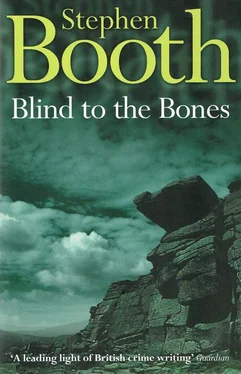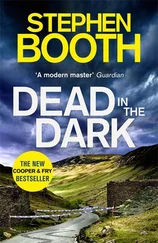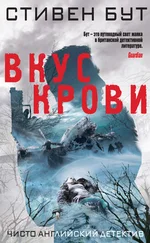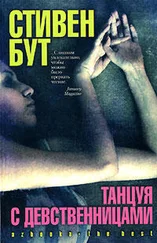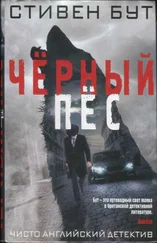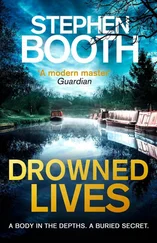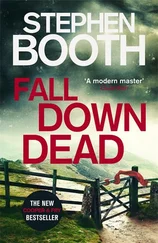‘Do you know anything else about David Senior?’
‘He used to work at the chemicals factory with Neil. That’s where they met, but that’s all I know about him.’
‘Does he ride a motorbike?’
Granger frowned. ‘Not as far as I know. Why?’
‘We were told that some of your brother’s friends were bikers.’
‘If it was Neil’s neighbours who told you that, they probably meant me. I ride a motorbike.’
‘Probably,’ said Hitchens, as if that had confirmed what he suspected.
Now Granger looked a bit uncomfortable, perhaps feeling that he hadn’t helped as much as he hoped he would.
‘There was something else.’
‘Yes, sir?’
‘You were asking me about antiques and things...’
‘Have you remembered something?’
‘I’m not sure. But there was a small box on the mantelpiece in Neil’s house when I went there on Saturday. I didn’t think much of it at the time, but I don’t remember ever seeing it there before.’
Cooper searched his memory. He thought he had done pretty well checking the CD player, but he had never noticed the box.
‘What was it made of?’ he said.
‘It was metal. Bronze or brass, I couldn’t tell. About this big—’ Granger held his hands a few inches apart.
Hitchens looked at Cooper, who shook his head. ‘Well, well,’ said Hitchens. ‘Let’s see if anyone else has noticed it.’
As soon as Philip Granger had left, DI Hitchens’ manner changed. Cooper had to lengthen his stride to follow the DI back to his office.
‘Is there a rush, sir?’ he said.
‘We have to get on to it straight away,’ said Hitchens.
‘This bronze or brass box, you mean?’
‘Well, there’s that as well.’
‘And...?’
‘I need to get somebody to work turning over the local arse bandits. They’ll be shitting themselves knowing one of their bum chums has got himself done in.’
‘But, sir, didn’t you just say...?’
‘Of course I did.’ Hitchens stopped suddenly. ‘You’ve got to be sensitive with bereaved relatives, you know, Cooper. Didn’t they tell you that in training?’
‘Yes, sir.’
‘Well, then. Do you want to do bandits or box?’
‘Box,’ said Cooper.
Diane Fry and Gavin Murfin were on the M6 motorway, approaching the junction with the M5 north of Birmingham. They were already well inside the vast urban sprawl at the heart of the Black Country. It couldn’t have looked more different from the empty wastes of peat moor around Withens.
‘Is the Black Country the place where black pudding comes from?’ said Murfin.
‘Of course it isn’t.’
‘Well, I just wondered, like. I know Bakewell pudding comes from Bakewell, so I thought—’
‘No, Gavin, it doesn’t.’
‘OK.’
They were passing through the western edge of Smethwick, having taken the wrong exit from the M5 when Murfin got excited about seeing the West Bromwich Albion football ground. Fry was starting to feel edgy as they came closer to her old stamping grounds. The feeling of tension was like steel springs trying to pull her into the air, so that she hardly seemed to be touching her car seat. But she knew she mustn’t take out her own edginess on Gavin Murfin.
‘What about blackberry crumble, then?’ said Murfin.
‘No, Gavin! Now, will you shut up about it?’
‘All right.’
Fry remembered all too clearly shopping with her friends in Birmingham or at the Merry Hill shopping centre, touring the Birmingham clubs, drinking lager while she listened to the boys talking about West Brom.
They drove through Langley and hit traffic at the junction with the A4123 Wolverhampton Road, where the signs all seemed to point to the Merry Hill shopping centre. It had been Fry’s shopping mecca as a teenager, the place where all her friends had gone to meet on a Saturday — not to spend money, because they didn’t have any. Well, not unless somebody had nicked a few quid from their mum. They went just to walk around, to be there and be seen there. It made you part of the crowd, part of the Merry Hill lot.
With her friends, she had come to know the place so well that it was like a second home. They had learned all the ways of avoiding the security guards and the CCTV cameras. But there had been others attracted to Merry Hill shopping centre, too — men who had money, and had seemed attractive. And perhaps a little dangerous, too.
‘Black Forest gateau?’ said Murfin.
They turned south on Wolverhampton Road and headed towards Warley and Bearwood. And as soon as she saw the big white cross picked out in brickwork on the tower of Warley Baptist Church, she knew she was back home.
There were starlings roosting on the high ledges, their white droppings streaking brickwork that had always seemed a little ornate for a Baptist church. They stopped to fill up with petrol. On the forecourt of the petrol station, Fry saw the familiar blue-and-cream buses passing, and heard the sound of a genuine West Indian accent.
Murfin was intrigued by the Caribbean restaurants and Punjabi food stores they passed along the road.
‘A Somali takeaway!’ he said. ‘We don’t get those in Edendale.’
‘You’re not getting one here, either,’ said Fry. ‘Turn left up ahead.’
They turned into a housing estate and drove through the streets to Hilltop. Murfin didn’t question her directions, knowing that she was familiar with the area. They passed Warley High School on Pound Road. It was the middle of the morning, lesson time, so there were no kids hanging around outside. Fry heard a bell ring somewhere and was glad they were already past. She didn’t want to be in sight of the school when the kids appeared.
Warley Baths were now called a swimming centre. Further up Thimblemill Road was the library, where Fry had spent even more time, sitting among the books, looking for something she could relate to, something that told a story similar to her own. She had never found anything.
At the infant school someone had planted a yucca in a concrete flower bed, and there were security shutters over some of the windows. But it still looked much the same. Next door was the King’s Community Church. Had it been called that back in the 1980s? She had a feeling that ‘community’ had been an invention of the eighties. Before that, people hadn’t felt the need to use the name. A community was something you just were .
They negotiated their way through a series of little roundabouts, each with its cluster of shops and a pub. And on George Road she found the Plough still there at one end of the road, with the George Hotel at the other, near the infant school. Familiar places, all of them. Yet alien now, too, like backdrops for a recurrent bad dream.
From the roundabout near the Hilltop shops, she could see the view across the valley to more houses. There were some masts on the horizon, but she couldn’t remember what they were for.
‘Do you want to stop, Gavin?’ she said. ‘You can get a pie in the shop over there.’
‘Why, sure,’ said Murfin, surprised.
While he went into the shop, she walked a few yards back to the roundabout. Yes, the little brick semi was still there, too. It wasn’t a council house any more, by the look of it, but had probably been bought from the council by its occupants. The new owners had put in a Georgian-style front door and leaded windows, removed the crumbling rendering from the walls and covered them with artificial stone. They had painted all the woodwork white, and they had even erected a little wooden fence, which symbolically separated the house from the pavement.
For many years, Fry hadn’t been able to hear certain songs cropping up on the radio without being transported back to Warley. Anything by Right Said Fred or Salt ’n’ Pepa turned some kind of switch in her mind, and she instantly found herself again in that crumbling council house on the Hilltop estate. She would be lying on her bed in her own room, listening to a cheap stereo and holding the diary she had hidden under her spare sweaters in a bottom drawer, just as Emma Renshaw had done.
Читать дальше
Конец ознакомительного отрывка
Купить книгу
